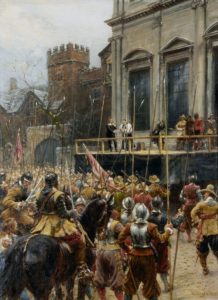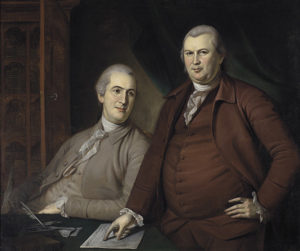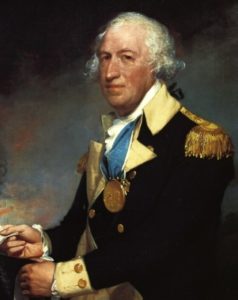THE NEWBURGH CONSPIRACY OF 1783
“I have ever considered that the United States are indebted for their republican form of government solely to the firm and determined republicanism of George Washington at this time.” – David Cobb, member of Washington’s staff
[dropcap]O[/dropcap]n a chilly Wednesday morning in December, Colonel Thomas Pride and the Regiment of Foot took up position on the steps leading to the House of Commons, while Nathaniel Rich’s Regiment of Horse stood by if reinforcements were needed. As the members of Parliament arrived to perform their usual duties, they were astonished to find these military troops stationed on the steps. Colonel Pride detained them and checked their names against a list of political dissidents drafted by the Army, and then arrested those on the list, hauling them away to be held as prisoners at Westminster. Over the next several days, more MP’s were arrested in what came to be known as Pride’s Purge, until of the 471 original members of Parliament, only 200 pro-Army members remained. The large military presence prevented potential outrage from the rest of the English government. Once the purge was completed and all the dissenting members of Parliament jailed, the military was able to push forward their own list of demands, culminating in the execution of the King and a pro-Army government, ending the First English Civil War in 1649.
What was especially awkward about the coup was that Parliament had created the very army that purged them. Six years earlier, when the war had broken out between Parliament and King Charles I, both sides used the traditional county militias to form the main body of their armies. But in 1645 Parliament decided to replace the unreliable militias by forming a standing, professional New Model Army. The New Model Army proved itself effective in the field, and by 1648 it had crushed the last remaining Royalist forces and taken Charles I prisoner.

Execution of Charles I
However, despite Parliament’s success the war had been an expensive affair, and they owed the New Model Army a considerable amount of back pay. Now that the war was over many of the soldiers within the Army became increasingly concerned that once they disbanded, Parliament would refuse to pay their promised wages. So even though hostilities with the King had ceased, the military commanders continued to keep the Army in camp and under arms outside London, applying pressure on Parliament to address the Army’s demands which included back pay, a Republican government, and the execution of the King. Parliament voted down the Army’s Remonstrances, but Colonel Thomas Pride responded by marching troops to the House of Commons and arresting all MP’s that the Army deemed unloyal. With the Army now in control, King Charles I was executed, and the remaining Rump Parliament, as it came to be called, declared England a Republic, free from the tyrannical rule of monarchs.
However, the military found the Rump Parliament just as difficult to work with as its predecessor, and on two more occasions the Army Council marched troops into the House of Commons to further purge Parliament. By 1655 they gave up all semblance at Republican rule, and England was divided into military regions each ruled over by Army Major-Generals who answered only to the Lord Protectorate, Oliver Cromwell. The dream of a commonwealth rule lay in shatters, and after Cromwell’s death England reinstated Charles I’s son as king, and the painful memory of the ill-fated Republic was hushed up.
***
[dropcap]T[/dropcap]he English Civil War and it’s revolutionary outcome left the English with a deep distrust of standing armies. The British Quartering Acts of 1765 and 1774 fueled Colonial distrust of Parliament, and the Declaration of Independence specifically pointed to “quartering large bodies of troops among us” as one of the reasons for secession from Britain.
In 1783, as the American Revolution wound to an end, the victorious Congress found itself in a situation uncomfortably similar to Parliament’s in 1648. Congress was straddled with an enormous war debt, inflated currency, and years of back-pay owed to the Continental Army. Furthermore, under the Articles of Confederation, Congress was not allowed to levy their own taxes, but instead had to rely on the state tax collectors, and the states were uncooperative and more interested in paying off their own debts than Congress’s.

Gouverneur and Robert Morris
Meanwhile a strong nationalist wing had emerged in Congress led by Robert Morris, Gouverneur Morris, James Madison, and Alexander Hamilton, who firmly pushed for a centralized federal government and the dissolution of the individual states into a single national entity.[1] But in order for their plan to work, Congress would have to be financially independent, which required the power to directly levy taxes, as well as a central banking system, something the states were reluctant to grant. Believing that they could pressure the states’ Congressmen to provide the required funding the nationalists decided to utilize the dissident faction in the army. As Hamilton later explained:
In this situation what was to be done? It was essential to our cause that vigorous efforts should be made to restore public credit—it was necessary to combine all the motives to this end, that could operate upon different descriptions of persons in the different states. The necessity and discontents of the army presented themselves as a powerful engine.
Having served for years without pay, the army was also willing to take drastic measures. In May of 1782, the army officers had proposed that General Washington be made king over the states, but Washington had turned down the offer with a strongly worded letter, and the officers had instead turned to Major General Horatio Gates, a longtime Washington rival, to lead their cause.
Later that year Robert Morris, Superintendent of Finance, met with the Army representatives and together they established a plan to pressure Congress with rumors of military unrest. “After the Army had set the stage and spread the threats, the nationalists would forge an acceptable funding system and maneuver it through Congress.”[2] Congress, unaware of Morris’s role in the conspiracy, turned to him to see if they could meet the army’s demands for payment. Morris was quick to paint a bleak situation. He informed Congress that the treasury was completely penniless and would need a constant revenue stream before they could take out new loans. He then further pressured Congress by tendering his resignation unless they established a federal taxation program. Congress kept Morris’s ultimatum a secret, not wanting the Army to know how desperate their situation was.[3]
However despite their predicament Congress remained reluctant to meet with the army officers to discuss a compromise, and so the conspirators wrote to General Knox urging him to not disband the army at its encampment in Newburgh until they had secured military payment from Congress. They further requested that Knox keep the army standing by and ready to mutiny should the occasion require it.[4]

Major General Horatio Gates
Hamilton then wrote a warning letter to Washington that if things continued on their present course, “the difficulty will be to keep a complaining and suffering army within the bounds of moderation,” and he urged Washington “to take the direction of them. . . . This will enable you in case of extremity to guide the torrent, and bring order perhaps even good, out of confusion.” Hamilton then threatened Washington that the military was already suspicious that he did not have their best interest at heart, and that if he refused to take their side now, then he would lose all remaining influence with them. Washington responded that he had received Hamilton’s “hint” contained in the letter, but while he sympathized with the Army, threatening Congress with military force would only serve to undermine the Republic they had fought so hard for. Meanwhile Knox also responded in a series of letters refusing to participate in the conspiracy.[5] With Washington and Knox out of the picture, the nationalists decided to use General Gates to spearhead their conspiracy within the Army.
The nationalists began to ramp up the threat of a military mutiny, and Robert Morris made his resignation public, knowing that it would be an open statement to the Army that Congress was unable to pay them. He then secretly met with Gates’s associate and gave the signal for the Army to take matters into their own hands. As Washington later wrote to Hamilton, Congress was now aware of the situation, and
it was universally expected the army would not disband untill they had obtained justice; That the public creditors looked to them for Redress of their own grievances, wd afford them every aid, and even join them in the Field if necessary; That some mem[bers] of Congress wished the measure might take effect, in order to compel the public, particularly the delinquent States, to do justice; with many other suggestions of a similar nature.
On March 10th, General Gates’s aide anonymously wrote and distributed a letter denouncing Congress’s poor treatment of the soldiers, and urging the Army to stop making weak requests of Congress. So long as they stood armed they could force Congress to pay them what they were owed, and “the slightest indignity from Congress now, must operate like the grave, and part you forever.”[6] At the same time an anonymous call went out for all the field officers to meet at 11 a.m. the next day to discuss a course of action.
Realizing that the Army was about to plunge themselves “into a gulph of Civil horror from which there might be no receding,” Washington reacted by seizing control of the situation. He wrote the Army a letter, changing the date of the meeting to Saturday in the hope that a few extra days would help cool their excitement, and adding that the meeting would be presided over by the senior officer present. He then requested that the officers send him the reports from the meeting, insinuating that he would not be present.
That Saturday the officers gathered to discuss their plan of action, with Gates presiding. The meeting had just begun when to everyone’s surprise Washington walked into the room. The men were not pleased to see him, but Gates stepped aside and allowed Washington to take the floor. Washington then gave a passionate speech, loudly denouncing the conspiracy as an attempt to “open the flood Gates of Civil discord, & deluge our rising Empire in Blood.” Finishing his speech, he then proceeded to read a letter from Congress pledging to pay the Army. In a gesture potentially apocryphal, Washington paused after reading the first paragraph and fumbled in his vest, looking for his glasses, which he had only begun to wear the month before. He then sadly commented: “Gentlemen, you will permit me to put on my spectacles, for I have not only grown gray but almost blind in the service of my country.”[7] Washington finished reading the letter and left the room. Many of his officers were openly in tears, and all the men except one approved a letter to Philadelphia expressing their “unshaken confidence” in Congress and “indignation [at] the secret attempts of some unknown persons to collect officers together, in a manner totally subversive of all discipline and good order.”[8] The letter was then distributed to Congress.
The result of the affair was a strong reaffirmation of the principles of republicanism. The nationalists lost the support of the Army, and with Morris’s offer of resignation now public, the conspiracy as well as the pressure for centralization collapsed. The Army disbanded, and Congress passed a compromised resolution to pay the soldiers a five years’ full pay instead of the original lifetime half-pay pension. Washington’s role in averting the Newburgh Conspiracy might be the single most important reason why the American Republic avoided the fate of its English counterpart and did not devolve into a short-lived military dictatorship.[9]
Originally posted at A Shot Glass of History.

Related: Cincinnatus and George Washington
Footnotes
[1] Murray Rothbard, Conceived in Liberty (Auburn, Alabama: Ludwig von Mises Institute: 2011), 1502-1503.
[2] Richard H. Kohn, “The Inside History of the Newburgh Conspiracy: America and the Coup d’Etat,” The William and Mary Quarterly 27, no. 2, 1970, 193.
[3] E. James Ferguson, Power of the Purse: A History of American Public Finance, 1776-1790 (Chapel Hill: University of North Carolina Press, 1961), 124
[4] Richard H. Kohn, “The Inside History of the Newburgh Conspiracy,” 197. Although the nationalists in Congress later claimed that they had only intended to threaten the use of military force without actually utilizing it, regardless of their intentions they were clearly playing with fire.
[5] Ibid., 203.
[6] Ford et al., eds., Journals of Continental Congress, XXIV, 295-297.
[7] As quoted in Thomas Fleming, The Perils of Peace: America’s Struggle for Survival after Yorktown (New York: Smithsonian Books, 2007), 271.
[8] Ford et al., eds., Journals of Continental Congress, XXIV, 310-311.
[9] Richard H. Kohn, Eagle and Sword: The Federalists and the Creation of the Military Establishment in America, 1783-1802 (New York: Free Press, 1975), 34–39.
